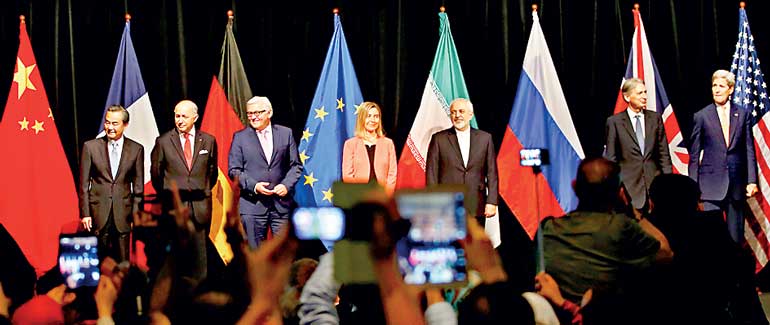Wednesday Feb 18, 2026
Wednesday Feb 18, 2026
Wednesday, 15 July 2015 00:00 - - {{hitsCtrl.values.hits}}
 Chinese Foreign Minister Wang Yi, French Foreign Minister Laurent Fabius, German Foreign Minister Frank Walter Steinmeier, High Representative of the European Union for Foreign Affairs and Security Policy Federica Mogherini, Iranian Foreign Minister Mohammad Javad Zarif, British Foreign Secretary Philip Hammond and U.S. Secretary of State John Kerry (L-R) pose for a family picture after the last plenary session at the United Nations building in Vienna, Austria July 14, 2015. Iran and six major world powers reached a nuclear deal on Tuesday, capping more than a decade of on-off negotiations with an agreement that could potentially transform the Middle East, and which Israel called an “historic surrender”. REUTERS
Chinese Foreign Minister Wang Yi, French Foreign Minister Laurent Fabius, German Foreign Minister Frank Walter Steinmeier, High Representative of the European Union for Foreign Affairs and Security Policy Federica Mogherini, Iranian Foreign Minister Mohammad Javad Zarif, British Foreign Secretary Philip Hammond and U.S. Secretary of State John Kerry (L-R) pose for a family picture after the last plenary session at the United Nations building in Vienna, Austria July 14, 2015. Iran and six major world powers reached a nuclear deal on Tuesday, capping more than a decade of on-off negotiations with an agreement that could potentially transform the Middle East, and which Israel called an “historic surrender”. REUTERS
Reuters: Iran and six major world powers reached a nuclear deal on Tuesday, capping more than a decade of on-off negotiations with an agreement that could potentially transform the Middle East.
Under the deal, sanctions imposed by the United States, European Union and United Nations would be lifted in return for Iran agreeing long-term curbs on a nuclear programme that the West has suspected was aimed at creating a nuclear bomb.
Reaching a deal is a major policy victory for both US President Barack Obama and Iran’s President Hassan Rouhani, a pragmatist elected two years ago on a vow to reduce Iran’s diplomatic isolation.
Both men face scepticism from powerful hardliners at home after decades of enmity between countries that referred to each other as “the Great Satan” and a member of the “axis of evil”.
Final talks in Vienna involved nearly three weeks of intense round-the-clock negotiations between US Secretary of State John Kerry and Iran’s Foreign Minister Mohammad JavadZarif.
Western diplomats said under the final agreement, Iran had accepted a “snapback” mechanism, under which some sanctions could be reinstated in 65 days if it violated the deal. A UN weapons embargo would remain in place for five years and a ban on buying missile technology would remain for eight years.
“All the hard work has paid off and we sealed a deal. God bless our people,” one Iranian diplomat told Reuters on condition of anonymity.
But hostility to the agreement from Washington’s closest ally in the Middle East was immediate.
“This deal is a historic surrender by the West to the axis of evil headed by Iran,” Israeli Deputy Foreign Minister TzipiHotovely said in a message on Twitter. “Israel will act with all means to try and stop the agreement being ratified.”
The foreign ministers of Iran and the six powers will meet at 0830 GMT at the United Nations centre in Vienna and a news conference will follow, a spokeswoman for the European Union said on Tuesday.
Iran’s Foreign Minister, Mohammad JavadZarif, and EU’s Foreign Policy Chief Federica Mogherini are expected to read a joint statement, diplomats said.
A deal will still face scrutiny by the US Congress, controlled by opposition Republicans who are sceptical of the Obama administration’s overtures to a country that has been an enemy since Iranian revolutionaries stormed the US embassy in Tehran in 1979.